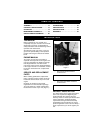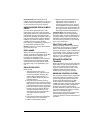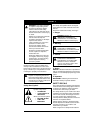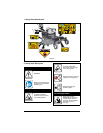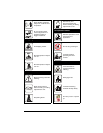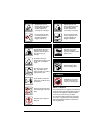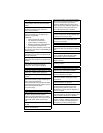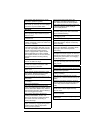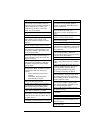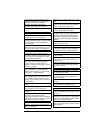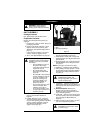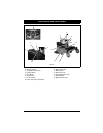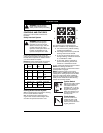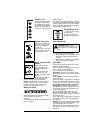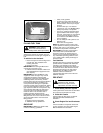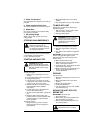
EN - 10
Slope Operation
Slopes are a major factor related to loss of
control and tip-over accidents, which can
result in severe injury or death. Operation on
all slopes requires extra caution. If you
cannot back up the slope or if you feel
uneasy on it, do not mow it.
DO NOT operate on slopes of more than
15°.
Mow up and down slopes, not across.
Watch for holes, ruts, bumps, rocks, or other
hidden objects. Uneven terrain could
overturn the machine. Tall grass can hide
obstacles.
Do not mow on moist or wet grass. Tires
may lose traction causing a loss of control.
Use extra care while operating machine with
grass catchers or other attachments; they
can affect the stability of the machine. Do
not use on steep slopes.
Keep all movements on the slope slow and
gradual. Do not make sudden changes in
speed or direction, which could cause the
machine to roll over.
Avoid starting, stopping, or turning on a
slope. If the tires lose traction, disengage
the blade(s) and proceed slowly straight
down the slope.
Operation on slopes may lead to loss of
steering control. When operating on slopes
be prepared to react to an emergency
situation:
• Return steering levers to neutral
position.
• Immediately set parking brake.
• Turn off PTO and engine.
DO NOT try to stabilize the machine by
putting your foot on the ground.
DO NOT park on slopes unless necessary.
When parking on slope always chock or
block wheels. Always set parking brake.
Choose a low ground speed so you will not
have to stop or shift while on a slope.
DO NOT operate near drop-offs, ditches, or
embankments. Unit can suddenly turn over if
a wheel is over the edge of a cliff or ditch, or
if an edge caves in.
Do not bypass transmission or allow
transmission to free-wheel when on a slope.
Fuel
To avoid personal injury or property damage,
use extreme care in handling gasoline.
Gasoline is extremely flammable and the
vapors are explosive.
Ethanol blends must not exceed E10. Higher
ethanol content may cause your
machine to run hotter and damage your
engine.
Replace fuel cap securely and clean up
spilled fuel before starting engine.
Extinguish all cigarettes, cigars, pipes, and
other sources of ignition.
Use only an approved gasoline container.
Never store the machine or fuel container
where there is an open flame, spark, or pilot
light such as on a water or space heater or
other appliances.
Never fill containers inside a vehicle or on a
truck or trailer bed with a plastic liner.
Always place containers on the ground away
from your vehicle before filling.
Never fuel the machine indoors.
Never remove gas cap or add fuel with the
engine running. Allow engine to cool before
fueling.
Fuel is highly flammable and its vapors are
explosive. Handle with care. Use only an
approved gasoline container with an
appropriately sized dispensing spout.
NO smoking, NO sparks, NO flames.
Remove gas-powered equipment from the
trailer and refuel it on the ground. If this is
not possible, then refuel such equipment
with a portable container, rather than from a
gasoline dispenser nozzle.
Keep the nozzle in contact with the rim of
the fuel tank or container opening at all
times until the fueling is complete. Do not
use a nozzle lock-open device.
Never overfill fuel tank. Replace gas cap
and tighten securely.
If fuel is spilled on clothing, change clothing
immediately.
Towing
Follow the manufacturer’s recommendations
for weight limits for towed equipment and
towing on slopes.
NEVER allow children or others in or on
towed equipment.



